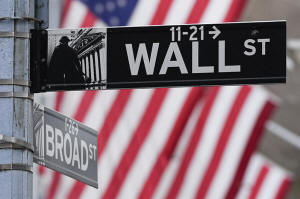Stocks tick higher after Wall Street flirts with another record
[September 09, 2025] By
STAN CHOE
NEW YORK (AP) ó Stocks drifted higher on Monday ahead of a week with
several data reports that could dictate by how much or even whether the
Federal Reserve will cut interest rates at its next meeting in a week.
The S&P 500 added 0.2% and finished just below its record set last week.
The Dow Jones Industrial Average rose 114 points, or 0.3%, and the
Nasdaq composite climbed 0.5% to its own all-time high.
AppLovin and Robinhood Markets helped lead the market after learning
they will join the S&P 500 index later this month, along with Emcor
Group. Many investment funds directly mimic the index or at least
compare their performance against it, so a stockís joining the list of
the 500 largest companies can draw investorsí dollars immediately.
AppLovin climbed 11.6%, and Robinhood jumped 15.8% while Emcor slipped
0.6%. They will replace three companies that have shrunk enough in size
to get demoted to S&Pís index of small stocks, the SmallCap 600. Those
stocks, MarketAxess Holdings, Caesars Entertainment and Enphase Energy,
ranged from a loss of 2.1% to a gain of 0.2%.
EchoStar jumped 19.9% after saying it agreed to sell spectrum licenses
to Elon Muskís SpaceX for $17 billion in cash and stock. SpaceX also
agreed to pay for roughly $2 billion of interest payments on EchoStar
debt through November 2027.
The deal will help SpaceXís Starlink business develop direct-to-cell
service, and it knocked down stocks of several telecoms. Verizon sank
2.4%, and AT&T dropped 2.3%.

PNC Financial Services Group slipped 0.3% after it said it would pay
$4.1 billion to buy FirstBank, a bank owner based in Lakewood, Colorado.
All told, the S&P 500 rose 13.65 points to 6,495.15. The Dow Jones
Industrial Average added 114.09 to 45,514.95, and the Nasdaq composite
climbed 98.31 to 21,798.70 and topped its prior all-time high set in
August.
Trading across most of the market was relatively quiet ahead of updates
coming later this week on the economy and inflation. They could alter
expectations among traders, who at the moment are unanimously
forecasting the Fed will cut its main interest rate for the first time
this year at its meeting two Wednesdays from now.
Investors tend to love such cuts because they can give a boost to the
economy and to prices for investments. The downside of them is that they
can also push inflation higher.
So far this year, the Fed has been more worried about the potential of
inflation worsening because of President Donald Trumpís tariffs than
about the job market. But a slew of recent reports showing the U.S. job
market is slowing may be changing minds.
On Tuesday, the U.S. government will release preliminary revisions for
job growth numbers reported through March, and it could show that hiring
was weaker than earlier thought.
[to top of second column] |

A sign outside the New York Stock Exchange marks the intersection of
Wall and Broad Streets, Tuesday, Jan. 28, 2025, in New York. (AP
Photo/Julia Demaree Nikhinson, File)
 Reports on inflation will follow on
Wednesday and Thursday, showing how much prices rose last month at
the wholesale and at the consumer levels. If inflation proves to be
worse than expected, it could tie the Fedís hands.
Fed officials would need to decide which problem is more pressing,
either the job market or inflation, because they have only one tool
to fix them. And raising or lowering interest rates to help one
tends to hurt the other in the short term.
U.S. companies have been trying several ways to preserve their
profits in the face of tariffs, which push up prices for all kinds
of things imported to the country. Many industrial companies are
talking about their ability to raise prices, according to
strategists at Morgan Stanley led by Michelle Weaver. Companies that
sell nonessentials directly to consumers, meanwhile, are talking
more about stockpiled inventories, which could be delaying the hit
that U.S. households will feel.
In the bond market, Treasury yields continued to ease as
expectations remain high for the Fed to cut interest rates. The
yield on the 10-year Treasury fell to 4.04% from 4.10% late Friday
and from 4.28% last Tuesday.
In stock markets abroad, indexes rose across much of Europe and
Asia.
Japanís Nikkei 225 jumped 1.5% for one of the larger gains after
Prime Minister Shigeru Ishiba announced that he plans to resign.
Analysts said Ishibaís announcement was expected for some time and
welcomed it as moving things forward, although uncertainty remains
as the ruling Liberal Democratic Party will need to hold an election
to choose a new leader. Ishiba will remain prime minister until his
successor is chosen and approved by parliament.
Also Monday, Japanís Cabinet Office said the economy expanded at a
stronger rate in the fiscal first quarter than previously estimated,
at a seasonally adjusted 2.2% annualized rate, better than the
earlier 1.0% rate as solid consumer spending and inventories lifted
growth more than previously thought.
___
AP Business Writers Yuri Kageyama and Matt Ott contributed.
All contents © copyright 2025 Associated Press. All rights reserved
 |